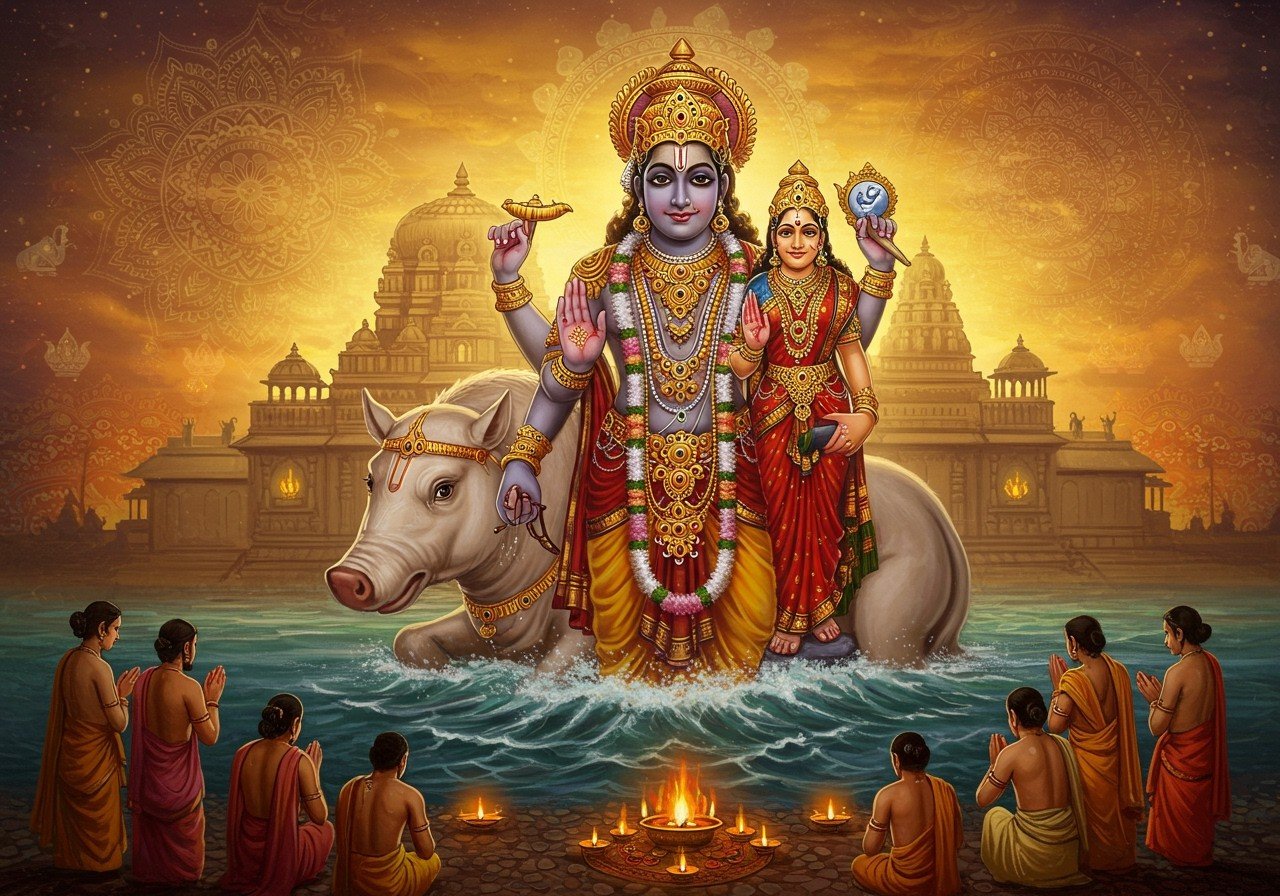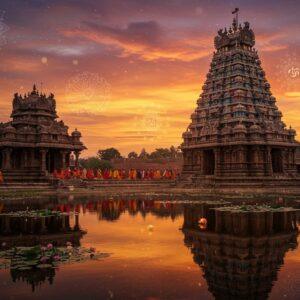
Delve into the spiritual heart of India by exploring the magnificent Varahaswamy Temples, dedicated to Lord Varaha, the boar incarnation of Lord Vishnu. These sacred sites are not just places of worship; they are repositories of rich cultural heritage, architectural brilliance, and profound mythological significance. Discover the captivating legend of Lord Varaha and his role in Hindu cosmology, while appreciating the historical importance of these temples in preserving ancient traditions and rituals.
Historical and Mythological Significance of Varahaswamy Temples
The Varahaswamy Temples draw their significance from the ancient legend of Lord Varaha, the third avatar of Lord Vishnu. As narrated in sacred texts like the Bhagavata Purana and Vishnu Purana, Lord Varaha rescued Goddess Bhudevi, the Earth, from the clutches of the demon Hiranyaksha. This divine act symbolizes the protection and sustenance of the Earth, a concept deeply embedded in Hindu cosmology. Lord Varaha’s act of lifting the Earth from the depths of the ocean on his tusks represents the triumph of good over evil and the restoration of cosmic balance.
These temples have evolved over centuries, bearing the imprints of various dynasties like the Cholas, Pallavas, and Vijayanagara empires. Each dynasty has contributed unique architectural elements and artistic styles, making these temples living testaments to India’s rich history. The Varaha Swamy Temple in Tirumala, Andhra Pradesh, for example, is believed to be even older than the renowned Venkateswara shrine, adding another layer to its historical significance.
Architectural Marvels
Varahaswamy Temples showcase a stunning array of architectural styles, predominantly Dravidian and Nagara. The Varaha Temple in Mahabalipuram, Tamil Nadu, stands as a testament to the intricate artistry of rock-cut architecture. Its elaborate carvings depict scenes from the Varaha legend and other mythological narratives. The Khajuraho Varaha Temple in Madhya Pradesh, on the other hand, is renowned for its exquisite sculptures and detailed iconography, reflecting the unique artistic sensibilities of the Chandela dynasty.
Constructed using diverse materials like granite, sandstone, and marble, these temples feature key architectural elements like the sanctum sanctorum (garbhagriha), mandapas (pillared halls), and gopurams (towering gateways). These elements not only enhance the aesthetic appeal but also contribute to the spiritual ambiance of the temples.
Rituals and Festivals
Daily rituals at Varahaswamy Temples include abhishekam (ritual bathing), alankaram (decoration), and aarti (ceremonial worship). These rituals, performed with meticulous precision by temple priests, evoke a sense of reverence and devotion. Major festivals like Varaha Jayanti and Narasimha Jayanti draw large congregations of devotees, creating a vibrant atmosphere of faith and celebration. The distribution of prasad (sacred offerings) is an integral part of these festivities, symbolizing divine blessings and communal harmony.
Temple priests, trained in ancient Vedic traditions, play a vital role in maintaining the sanctity of these rituals. They chant sacred mantras, sing devotional hymns, and play traditional musical instruments, creating an immersive spiritual experience for devotees.
Cultural and Social Impact
Varahaswamy Temples are not merely religious centers; they are vibrant hubs of social and cultural activity. They play a crucial role in fostering social cohesion within local communities, organizing charitable activities like annadanam (free meals) and supporting education and healthcare initiatives. These temples also serve as custodians of traditional arts and crafts, promoting skills like temple architecture, sculpture, and painting.
Women and marginalized groups actively participate in temple activities and festivals, reinforcing the inclusive nature of these sacred spaces. Temple tourism contributes significantly to the local economy, providing livelihood opportunities for local businesses and artisans.
Poojn.in: Your Companion on the Spiritual Journey
As you plan your visit to these sacred sites, let poojn.in be your trusted partner in procuring all your puja needs. We offer a wide range of authentic puja items, including:
- Varaha Idols: Discover exquisitely crafted Varaha idols in various sizes and materials, perfect for home altars or as offerings. We offer idols made from pure copper, brass, marble dust, and more.
- Puja Kits: Simplify your puja preparations with our comprehensive puja kits, containing all the essential items required for Varaha worship. These kits include incense, camphor, kumkum, and other necessary items.
- Sacred Threads and Garlands: Adorn your deity with beautiful sacred threads and garlands, adding a touch of reverence to your worship. Choose from a variety of materials and designs.
Visit poojn.in today and explore our extensive collection of spiritual products, designed to enhance your connection with the divine. We are committed to providing high-quality, authentic puja items, delivered right to your doorstep.
Conclusion: Embrace the Sacred Journey
A pilgrimage to the Varahaswamy Temples is more than just a visit; it’s an immersive experience that connects you with India’s rich spiritual heritage. These temples, steeped in history and mythology, stand as magnificent examples of ancient architecture. The daily rituals, grand festivals, and the palpable sense of devotion create an atmosphere of profound spiritual significance.
By visiting these sacred sites, you not only embark on a personal spiritual journey but also contribute to the preservation of a vital part of India’s cultural legacy. Allow the divine presence of Lord Varaha to inspire you, and carry the blessings of these sacred temples with you on your life’s journey.


